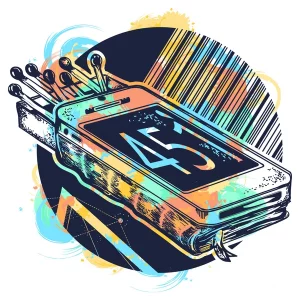Don’t Light A Match
My teenage daughter and I recently discussed the book she just finished reading for school, Ray Bradbury’s novel “Fahrenheit 451.”[1] What we both found fascinating was how, nearly 75 years ago, he imagined much of the situation we find ourselves in today.  Written in 1951 Bradbury portrays, he imagined a world where people are entertained day and night by staring at giant wall screens in their homes. They interact with their “friends” through these screens, listening to them via “Seashells” inserted in their ears. In this world, people would be fed full of what he calls “ noncombustible data,” such as popular song lyrics, state capitals, and agricultural statistics. They will “feel they’re thinking,” Bradbury wrote, “and they’ll be happy because facts of that sort don’t change.”[2] In his imagined dystopia, society promised peace through censorship. promised peace by creating a homogenous society where no one would be more intelligent than another. There is no individuality from one person to another. They follow the norms society has deemed trendy or normal. They found certain ideas to be combustible, which would bring chaos. So they burned books. While many of the concepts imagined by Bradbury in 1951 have manifested themselves today, like “Seashells” in the ears and 24/7 screen time, according to Yascha Mounk, we are far from homogenous. In this post, I will explore a couple of ideas I think are important to consider from his recent book, “Identity Trap.”[3]
Written in 1951 Bradbury portrays, he imagined a world where people are entertained day and night by staring at giant wall screens in their homes. They interact with their “friends” through these screens, listening to them via “Seashells” inserted in their ears. In this world, people would be fed full of what he calls “ noncombustible data,” such as popular song lyrics, state capitals, and agricultural statistics. They will “feel they’re thinking,” Bradbury wrote, “and they’ll be happy because facts of that sort don’t change.”[2] In his imagined dystopia, society promised peace through censorship. promised peace by creating a homogenous society where no one would be more intelligent than another. There is no individuality from one person to another. They follow the norms society has deemed trendy or normal. They found certain ideas to be combustible, which would bring chaos. So they burned books. While many of the concepts imagined by Bradbury in 1951 have manifested themselves today, like “Seashells” in the ears and 24/7 screen time, according to Yascha Mounk, we are far from homogenous. In this post, I will explore a couple of ideas I think are important to consider from his recent book, “Identity Trap.”[3]
The Trap
First, we must understand what Mounk claims is the “Trap.” Traps are alluring by nature. They offer something enticing and desirable. Mounk identifies the lure by a term he calls “Identity Synthesis.” He explains its allure as “A noble ambition: to remedy the serious injustices that continue to characterize every country in the world, including the United States.”[4] It is easy to see the allure. However, another important aspect of a trap is that people can get stuck and make the situation worse. In an attempt to ensure equal treatment and justice for all, Mounk demonstrates that a priority has emerged for people to define themselves according to attributes such as race, gender, cultural origin, or sexual orientation.[5] This has pitted subgroups against each other. Rather than celebrate similarities, Identity Synthesis prioritizes differences and polarizes people.
A Combustible Echo Chamber
Another key idea that Mounk illustrates is the volatility produced by the trap of Identity Synthesis. As people gather into silos based on attributes, growing more polarized, they become anxious and antagonistic. Ready to “Combust” over anything that doesn’t resonate with the messages already bouncing around their
echo chamber. In this way, Identity Synthesis creates what Friedman calls “Chronic Anxiety.” As stated in “A Failure of Nerve”:

“Chronic anxiety can be compared to the volatile atmosphere of a room filled with gas fumes. The issues over which chronicallyanxious systems become concerned are more likely to be the focus rather than the cause of anxiety.”[6]
Mounk demonstrates that social media and online communities expanded and popularized Identity synthesis.[7] Additionally, it seems social media increases unhealthy polarization by creating echo chambers where individuals are only exposed to views that reinforce their beliefs. These echo chambers tend to radicalize rather than moderate a group posture.[8] Dissenting views lead to “Combustion.”
Free Speech is Fundamental
A third key idea from Mounk’s work is related to free speech. For a society to be healthy, there needs to be a climate of free speech and an open exchange of ideas. The current trap of Identity Synthesis seems to hinder this. In fact, internal dissent is vital for a group’s success. It guards against groupthink and aids in crucial decision-making.[9] Two things stem from this idea: First, Free Speech is crucial. Not only because of the benefits it provides but also because of the negative consequences if restricted or lost. Censorship can be used to keep people from truth and reality. A second is to avoid echo chambers. Unfortunately, the current social media algorithms do not aid in our pursuit of intellectual liberty. Designed to keep us on the screen, they continue to bring before us the images and information we have indicated interest in previously. Avoiding the echo chamber requires effort.
Takeaways
First, Mounk’s work challenges me to consider ways I have reduced my identity to personal attributes rather than to Christ. Like any trap, it is tempting but dangerous. However, Mounk’s work draws attention to the reality of the Identity Synthesis trap and its consequences.
Second, I am inspired to find voices outside my own echo chamber, both theologically and politically. In fact, this doctoral program has already served me well in this regard. Thank you, everyone!
________________________________________
[1] Bradbury, Ray, Fahrenheit 451, (New York: Del Rey Books, 1992).
[2] Bradbury, Ray, Fahrenheit, 58.
[3] Mounk, Yascha, Identity Trap, (New York: Penguin Press, 2023).
[4] Mounk, Yascha, Identity Trap, 17.
[5] Mounk, Yascha, Identity Trap, 11.
[6] Friedman, Edwin, A Failure of Nerve: Leadership in the Age of the Quick Fix. (New York: Church Publishing, 2007), 55.
[7] Mounk, Yascha, Identity Trap, 100.
[8] Yascha Mounk, “Echo Chambers” (Athens Democracy Forum, Athens, Greece, September 16-18, 2018),https://www.nytimes.com/video/opinion/politics/100000006109872/yascha-mounk-on-online-echo-chambers.html.
[9] Mounk, Yascha, Identity Trap, 124.
7 responses to “Don’t Light A Match”
Leave a Reply
You must be logged in to post a comment.
Hi Chad – I have experienced you engaging in healthy conversations with people who think differently than you – thank you for being willing to step out into those conversations. As a pastor, this is a gift that you can to your congregation.
As you were considering the identity synthesis for yourself, did you find any ways in which you have been trapped and want to break free?
Hi Chad, As I read your blog I thought about the church you are serving and your nonanxious presence that is starting to show signs among the staff that God is working through that. Are there silos within your staff or the congregation that would benefit from learning more about each other and their unity in Christ? Obviously, their anxienty was caused by someone who abused his power when leading the congregation. However, do you think there is any crossover here?
Chad,
This program certainly helps us find other voices and other opinions. It is good to learn from each other. You mentioned Free Speech and how it was a key point of Mounk. It is one area that I do struggle with at this point. The challenge I have is how are we to discern between Free Speech from an individual and Free Speech from an AI generated platform? Does AI get Free Speech? The disinformation campaigns right now plaguing our communities make this difficult to discern.
Chad,
Great post, I have not read Bradbury’s novel, but I think at least one of my kids did. I tend to stay off social media except to post updates on my family or a fun adventure we had. I am wondering if you see symptoms of the Identity Trap in your own church? I know it was present in mine and our former pastor ruffled some feathers.
Hey Chad, I love your post and your highlight on free speech. As Mounk asserts, free speech is fundamental. However, free speech is also paving the way for more hurtful and harmful outcomes in this present society. It has also opened the door for more “identities” to create and find their voice. Using free speech as an example, how can we create a more equitable and just environment while avoiding the identity trap?
Chad,
Thank you, as well. Your thoughts have helped me to “see” the other side of the coin.
Would you talk a little more about how you view “The Trap” and how you navigate Mounk’s thoughts in context with both your own community as well as your NPO statement?
Great post Chad, thank you. I love how you synthesize (no pun intended) the key points from the book.
I’m also especially intrigued by the concept of how silos of people grow more polarized, creating ever-more anxiety and antagonism. I think of Kari’s post where she focused on Micah 6:8, doing justice, offering mercy, and being humble in the name of the Lord.
I wonder how we all can find ways to do these things in our own contexts, in the midst of an anxious society? How might you bring them to bear in your contexts?